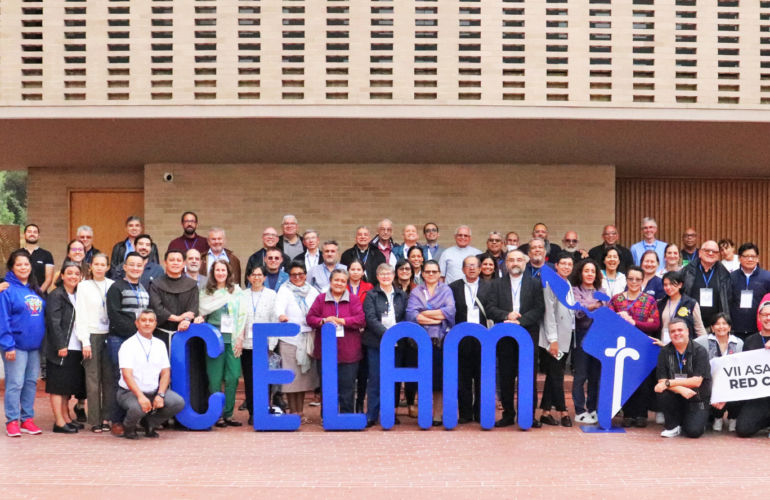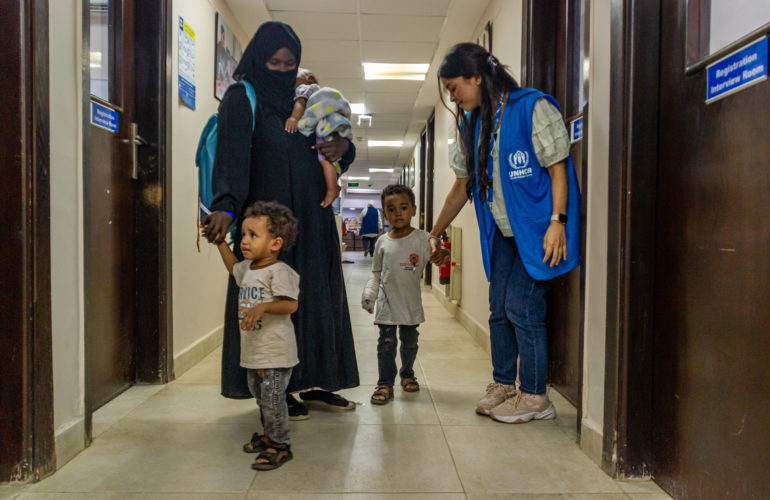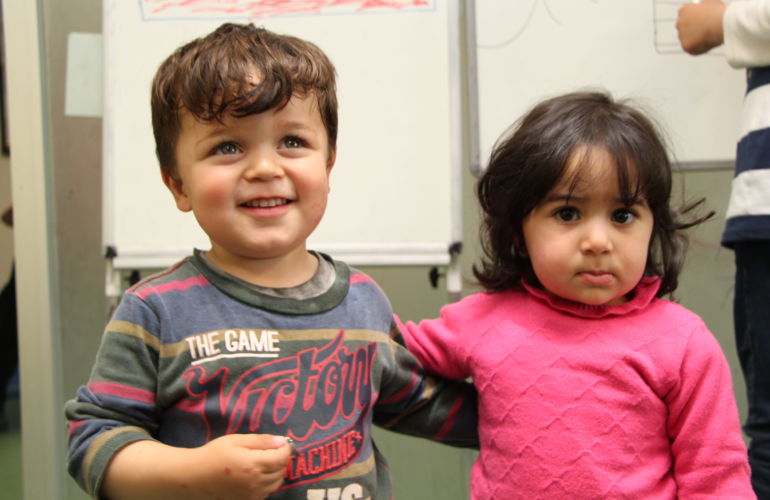Bishops’ Conference in England and Wales Urges Recognition of the Dignity and Humanity of Those Seeking Protection
Amidst increasingly restrictive UK asylum policies and ongoing deaths in the English Channel, the Catholic Bishops’ Conference of England and Wales continues to raise its voice in support of dignity and equality for all.
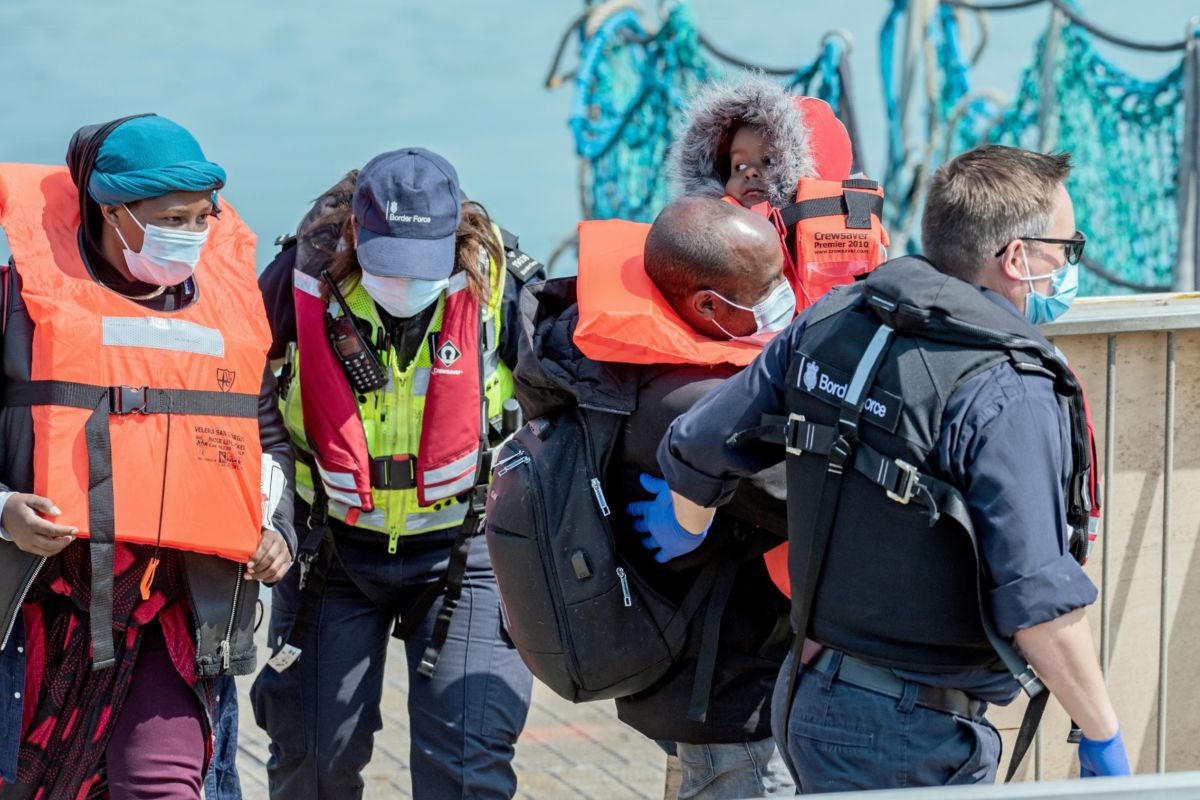
“How many have died in our own waters without their names or stories ever being known? We should not reduce people to statistics or a political problem to be solved.”
These words, from Bishop Declan Lang and Bishop Paul McAleenan, open Love The Stranger: A Catholic Response to Migrants and Refugees, a February 2023 publication by the Catholic Bishops’ Conference of England and Wales (CBCEW). Their pertinence and relevance persevere, as yet another tragedy in the English Channel claimed the lives of five people, including a child, when a boat carrying approximately 110 people seeking protection capsized off the French town of Wimereux, south of Calais, on 23 April 2024.
Dignity, equality and a culture of encounter: formulating a Catholic response to the situation of those seeking protection
“Love the Stranger was born from our desire to offer a structured Catholic response to what was, and continues to be, an extremely turbulent period for refugees and asylum seekers in the UK and beyond,” explains Bishop McAleenan, Lead Bishop for Migrants and Refugees and member of the Department for International Affairs at CBCEW. “We are as ever guided in our response by the Catholic social teaching principle of the innate human dignity of every person, and the 24 principles set out in Love the Strangerencapsulate this. They guide our collective work at national, diocesan and parish level, and we are delighted that the publication has been endorsed by both the Vatican and the Commission of the Bishops’ Conferences of the European Union.”
The CBCEW and Bishop McAleenan’s approach additionally draw on Pope Francis’s message concerning the importance of the encounter, set out in his Encyclical Letter Fratelli Tutti.
“I have had the position of Lead Bishop for Migrants and Refugees since 2016, and my role is to be alert to policies which threaten to undermine the dignity of those seeking protection and to present the Church’s view on how society should view migrants, refugees and asylum seekers,” Bishop McAleenan explains. “In Fratelli Tutti, Pope Francis reminds us that isolation and withdrawal into one’s own interests are never the way to bring about change and renewal. What we need instead is closeness and a culture of encounter, and we endeavour to realize this approach in our work.”
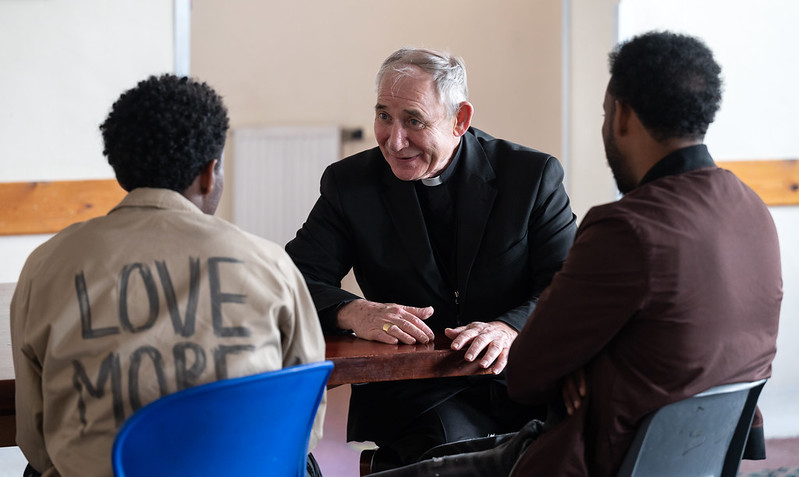
CBCEW’s commitment to dignity and equality sits alongside this practical realization of encounter. “While government ministers talk about numbers and means of arrival, the Church’s starting point is always dignity and equality,” says Bishop McAleenan. “For example, reducing people to categories such as ‘highly skilled’ is an offence to dignity, because it implies some people are worth more than others. Focusing on the means of arrival similarly demeans people for choosing the only option available to them to seek protection.”
Small boats and deaths in the Channel: the UK context
The UK immigration policy referenced by Bishop McAleenan began in late 2018 when significant numbers of migrants began crossing the English Channel in small boats. Such crossings were previously extremely rare, but a combination of high levels of global displacement, the increased securitization of other irregular routes into the UK, and the emergence of increasingly sophisticated smuggling operations led many to attempt the dangerous sea journey across the busiest shipping route in the world.
2021-22 saw unprecedented increases in small boat arrivals, peaking at 45,755 in 2022. While numbers fell in 2023, further increases are predicted for 2024, with arrivals in the first five months of the year exceeding those in the same period of any year since data began to be collected in 2018.

“We met with UK government ministers in late 2018 and into 2019, when the numbers of small boat arrivals began to increase,” recalls Bishop McAleenan. “We had a very wide-ranging discussion on small boats and UK immigration policy in general, in which we emphasized that each person, whether legally entitled to protection or not, has a right to be treated with dignity. I do think that those in government individually understand this to be true, despite the limited way in which it is sometimes put into practice via policy.”
The hugely risky nature of the sea journey across the Channel is evidenced by the drowning deaths of 73 persons traveling in small boats from 2018 to 2024, including the five people who lost their lives on 23 April 2024, and by the 566 survivors of small boat incidents in which others drowned.
The route also is perilous for those who attempt the crossing by other means, as shown by the 88 personswho died in non-drowning incidents on the Channel route during the same period. The majority of deaths were caused by vehicle accidents, occurring during attempts to board or hide in lorries and trains crossing to the UK via under-sea tunnels, or while moving on busy roads on the approach to tunnel departure points.
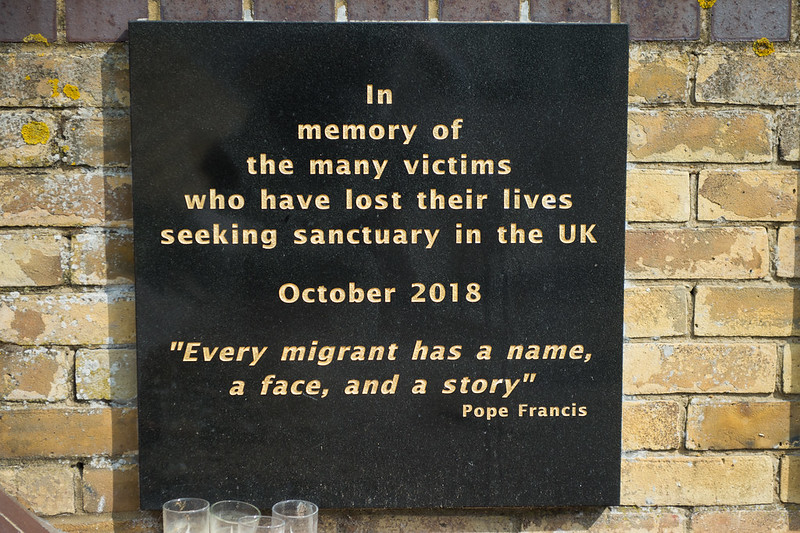
“The media of course plays on people’s fears, though our perspective is that those travelling originate from places of danger or poverty and are seeking sanctuary and a better life,” says Bishop McAleenan, recalling his visit with CBCEW to informal camps in northern France from where many migrants travel onwards to the UK. “I was touched by the humanity of these young men who had slept all night in light clothes in freezing conditions in a wooded area. I was in the company of Secours Catholique who provided hot drinks each morning. When the men saw us approach they arose from the fire which they had lit from fallen branches and invited us to take their place close to the warmth. Such generosity revealed so clearly that these young men, even after long traumatic journeys and much hardship, had not lost their humanity or capacity to feel for others.”
Barracks and barges: conditions for those seeking protection in the UK
The UK government’s response to the ‘small boats issue’ has been to introduce a range of restrictive policies that have severe implications for those seeking protection.
Since late 2020, a new national asylum accommodation strategy has created collective reception accommodation for asylum seekers in surplus military facilities, including disused barracks and temporary ‘modular’ accommodation on military sites. Conditions at Napier Barracks, the flagship facility for this policy located in Kent, England, have been described by Amnesty International as “squalid and inhumane,” while parliamentary evidence submitted by refugee health experts asserted that the use of barracks to house asylum seekers was both harmful to their health and well-being, and a risk to wider public health.
From mid-2023, this policy was extended to include ‘offshore accommodation,’ in the shape of three barges that would be docked at UK ports, each accommodating several hundred asylum seekers. After several portand local authorities refused permission for two of the barges to dock, only the Bibby Stockholm could finally become operational. This barge now houses a reported 300 asylum seekers, despite ongoing concerns as to living conditions expressed by elected officials and the December 2023 suicide of a young barge resident from Albania.
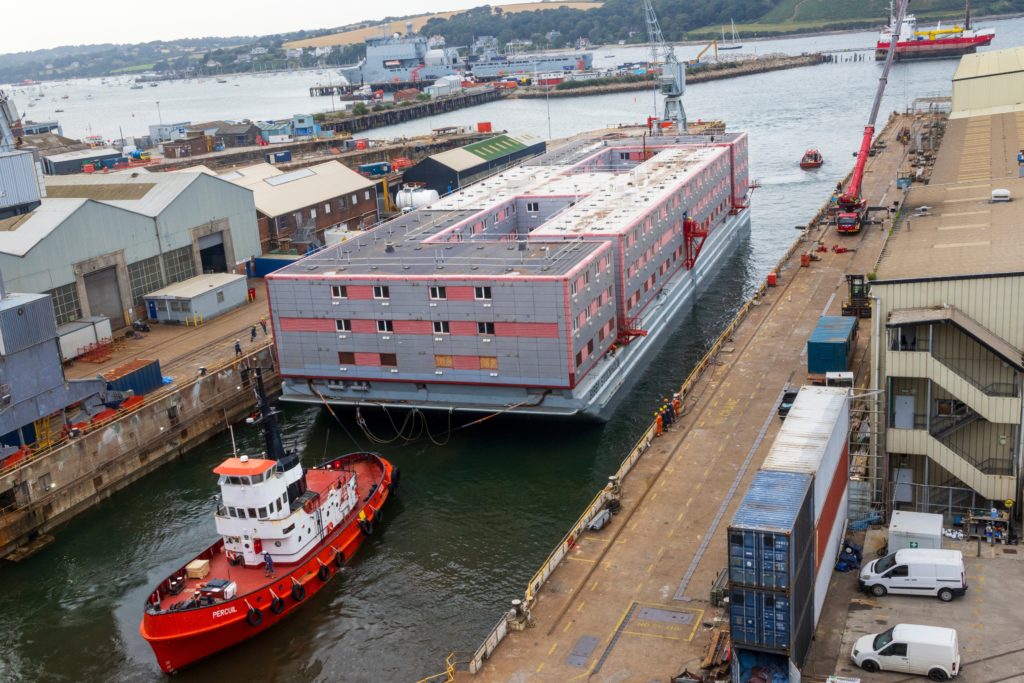
In March 2022, Bishop McAleenan accompanied Apostolic Nuncio Archbishop Claudio Gugerotti to Napier Barracks on a visit coordinated with the UK Home Office at the Nuncio’s request. “During our visit to Napier Barracks, the Nuncio asked a general question to an assembled group of those resident, ‘What is it you want?’,” he recalls. “At first there was silence, and the Nuncio repeated his question. An answer received from a young man was humbling: he didn’t refer to his asylum claim, or to housing, employment, or any other aspect of his status or conditions, but replied simply ‘I would like to see my mother’.”
A right to protection? The Rwanda Plan and asylum in the UK
By far the most dramatic shift in UK asylum policy came in April 2022, when then Prime Minister Boris Johnson announced a new Migration and Economic Development Partnership agreed between the governments of the UK and Rwanda. Under this agreement, asylum seekers who have entered the UK ‘illegally’ (meaning not via resettlement) can be removed to Rwanda, where their claims for protection will be adjudicated. Those found to be in need of international protection will remain in Rwanda rather than being able to return to the UK.
For much of the next two years, the so-called Rwanda Plan was subject to several legal challenges, mostly concerning the safety of Rwanda and its capacity to fairly determine asylum claims, and both European and UK courts blocked removals under the scheme. To circumvent these judgments, in December 2023 the UK government introduced the Safety of Rwanda (Asylum & Immigration) Bill, a new piece of legislation that sets out in law that Rwanda is a ‘safe third country’ for the purposes of the removal of asylum seekers. The Bill was signed into law in April 2024, and although no flights to Rwanda have yet been arranged, the first asylum seekers deemed eligible for removal under the scheme have since been detained in locations across the UK.
The stated aims of the Rwanda Plan are to deter Channel crossings, ‘break the business model’ of organized smuggling operations, and reduce costs associated with supporting asylum seekers in the UK. While removals to Rwanda have yet to take place, the policy’s announcement has, in fact, coincided with a comparative increase in small boat crossings relative to 2023. The UK’s National Audit Office has estimated that if 300 persons are removed to Rwanda, the cost per person would be approximately £2m, against an estimated £106,000 for each asylum claim processed in the UK.
“Our principle is that the UK should not export its problems overseas,” states Bishop McAleenan. “It is almost offensive and absolutely not mature to pay a developing country many millions of pounds to deal with a UK problem, and it is not the response of a country which prides itself on its humanitarian approach to those seeking protection.”

CBCEW has set out this principled opposition to the Rwanda Plan in a number of statements, most recently in an April 2024 joint statement with leaders of the Church of England, Methodist, Baptist, and United Reformed Churches. “There is a very similar response across Christian groups, as Christian social teaching has a common position on a commitment to care for the most vulnerable,” explains Bishop McAleenan. He highlights here his intervention at the May 2023 annual speaker event of the London Churches Refugee Fund, which coordinates advocacy and supports destitute asylum seekers, in which he emphasized welcoming refugees and migrants as a Christian duty and an act of justice.
The Rwanda Plan is being implemented alongside the Illegal Migration Act, which came into force in July 2023. The Act provides the legal base for the Rwanda Plan by placing a duty on the UK government to remove anyone arriving irregularly to the UK, including by small boat or any other means of transport, either to their home country or to a ‘safe third country’ such as Rwanda.
“We are opposed to both the Rwanda Plan and the Illegal Migration Act, because both make it effectively impossible to seek protection in the UK,” states Bishop McAleenan. “During our visit to the Bibby Stockholm barge we met a number of those housed there who had received letters notifying them that they could be removed to Rwanda. Naturally they were terrified at this prospect. Unfortunately it is clear that the current government is determined to push ahead with the Rwanda plan. CBCEW is equally clear that in our commitment to dignity, equality and justice, we will continue to strongly oppose this plan.”
***
Update: Following the 22 May 2024 announcement of national elections in the United Kingdom, to be held on 4 July, the UK Prime Minister Rishi Sunak declared that removals to Rwanda would not take place until after the election had been concluded. The Rwanda scheme is likely to be a key issue in election campaigning, with the opposition Labour Party committed to scrapping the scheme and the Prime Minister declaring that the scheme’s implementation is “the choice at this election”.
In the interim, action by UK legal charity Asylum Aid has forced a change in government guidance on the selection of asylum seekers for removal to Rwanda, and the trade union for UK civil servants, the FDA, has launched a judicial review questioning the legality of their involvement in the scheme if and when it is implemented.

